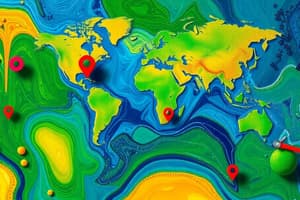Podcast
Questions and Answers
What is the focus of physical geography?
What is the focus of physical geography?
- Economic systems and urban development
- Technological tools for data analysis
- Natural features and ecosystems (correct)
- Human activities and cultures
Which of the following best defines 'region' in geographic terms?
Which of the following best defines 'region' in geographic terms?
- An area defined by cultural, physical, or economic features (correct)
- The movement of people and goods
- A specific point marked by coordinates
- A visible structure created by human activity
What does the concept of globalization refer to?
What does the concept of globalization refer to?
- The loss of biodiversity in ecosystems
- Patterns of agricultural practices
- The growth of cities from rural areas
- The increasing interconnectedness of cultures and economies (correct)
Which branch of geography focuses on the analysis of human activities?
Which branch of geography focuses on the analysis of human activities?
What do geospatial technologies typically include?
What do geospatial technologies typically include?
Which theme addresses the impact of human activity on the environment?
Which theme addresses the impact of human activity on the environment?
Which concept refers to the absolute position on the Earth's surface?
Which concept refers to the absolute position on the Earth's surface?
What is the primary purpose of maps in geography?
What is the primary purpose of maps in geography?
Flashcards are hidden until you start studying
Study Notes
Key Concepts in Geography
- Definition: Study of the Earth's landscapes, environments, and the relationships between people and their environments.
Branches of Geography
-
Physical Geography:
- Focuses on natural features like landforms, climate, vegetation, and ecosystems.
- Key areas: geomorphology, climatology, biogeography, hydrology.
-
Human Geography:
- Examines human activities, cultures, economies, and their relationship with the environment.
- Key areas: urban geography, cultural geography, economic geography, social geography.
-
Geospatial Technologies:
- Tools for collecting and analyzing geographical data.
- Includes GIS (Geographic Information Systems), GPS (Global Positioning System), and remote sensing.
Geographic Concepts
-
Location:
- Absolute (exact coordinates) vs. Relative (location in relation to other places).
-
Place:
- Characteristics that define a location; both physical and human aspects.
-
Region:
- Areas defined by common features (cultural, physical, or economic).
- Types: formal (political boundaries), functional (central place and surrounding areas), and vernacular (perceived regions).
-
Movement:
- The flow of people, goods, and information across spaces.
-
Interaction:
- The relationship between human activities and the physical environment; includes concepts like sustainability and environmental impact.
Major Geographic Themes
-
Globalization:
- Increasing interconnectedness of economies, societies, and cultures.
-
Urbanization:
- The growth of cities and the movement of populations from rural to urban areas.
-
Environmental Change:
- Impact of human activity on natural systems; includes climate change, deforestation, and biodiversity loss.
-
Cultural Landscapes:
- The visible imprint of human activity on the landscape; includes architecture, land use, and agricultural practices.
Important Geographic Tools
-
Maps:
- Essential for understanding spatial relationships; includes thematic maps, topographic maps, and political maps.
-
Cartography:
- The art and science of map-making; involves design and analysis.
-
Remote Sensing:
- Use of satellite or aerial imagery to gather information about the Earth's surface.
Notable Geographic Concepts
-
Latitude and Longitude:
- Grid system for locating points on the Earth’s surface.
-
Cartographic Projections:
- Methods of representing the Earth’s curved surface on a flat map; affects accuracy of area, shape, distance, and direction.
Key Issues in Geography
-
Climate Change:
- Effects on weather patterns, sea levels, and ecosystems.
-
Resource Management:
- Sustainable practices for managing natural resources, including water, minerals, and energy.
-
Urban Sprawl:
- Uncontrolled expansion of urban areas, leading to environmental and social issues.
These notes provide a foundational overview of geography, its branches, concepts, tools, and notable issues.
Key Concepts in Geography
- Geography studies Earth's landscapes, environments, and interactions between people and their environments.
Branches of Geography
- Physical Geography: Analyzes natural features like landforms, climate, vegetation, and ecosystems. Major areas include geomorphology, climatology, biogeography, and hydrology.
- Human Geography: Investigates human activities, cultures, and economies, focusing on their relationship with the environment. Key areas include urban geography, cultural geography, economic geography, and social geography.
- Geospatial Technologies: Encompasses tools for collecting and analyzing geographical data, such as Geographic Information Systems (GIS), Global Positioning System (GPS), and remote sensing.
Geographic Concepts
- Location: Can be absolute (exact coordinates) or relative (relation to other places).
- Place: Combines physical and human characteristics that define a specific location.
- Region: Areas defined by shared features, categorized as formal (political boundaries), functional (central place and surrounding areas), or vernacular (culturally perceived regions).
- Movement: Describes the flow of people, goods, and information across spaces.
- Interaction: Refers to human activities' influence on the physical environment, incorporating sustainability and environmental impact.
Major Geographic Themes
- Globalization: Reflects the growing interconnectedness of economies, societies, and cultures worldwide.
- Urbanization: Describes the expansion of cities and the transition of populations from rural to urban settings.
- Environmental Change: Highlights human activities' effects on natural systems, including climate change and biodiversity loss.
- Cultural Landscapes: Represents the visible imprint of human activity on the landscape, including architecture and agricultural practices.
Important Geographic Tools
- Maps: Crucial for understanding spatial relationships, including thematic, topographic, and political maps.
- Cartography: Combines the art and science of map-making, focusing on design and analysis to convey geographical information.
- Remote Sensing: Utilizes satellite and aerial imagery for gathering information about the Earth's surface.
Notable Geographic Concepts
- Latitude and Longitude: The grid system used for pinpointing locations on Earth's surface.
- Cartographic Projections: Techniques for representing the Earth's curved surface on flat maps, influencing accuracy in area, shape, distance, and direction.
Key Issues in Geography
- Climate Change: Impacts weather patterns, sea levels, and ecosystems globally.
- Resource Management: Emphasizes sustainable practices for the stewardship of natural resources like water, minerals, and energy.
- Urban Sprawl: Refers to the uncontrolled expansion of urban areas, leading to environmental degradation and social challenges.
Studying That Suits You
Use AI to generate personalized quizzes and flashcards to suit your learning preferences.




